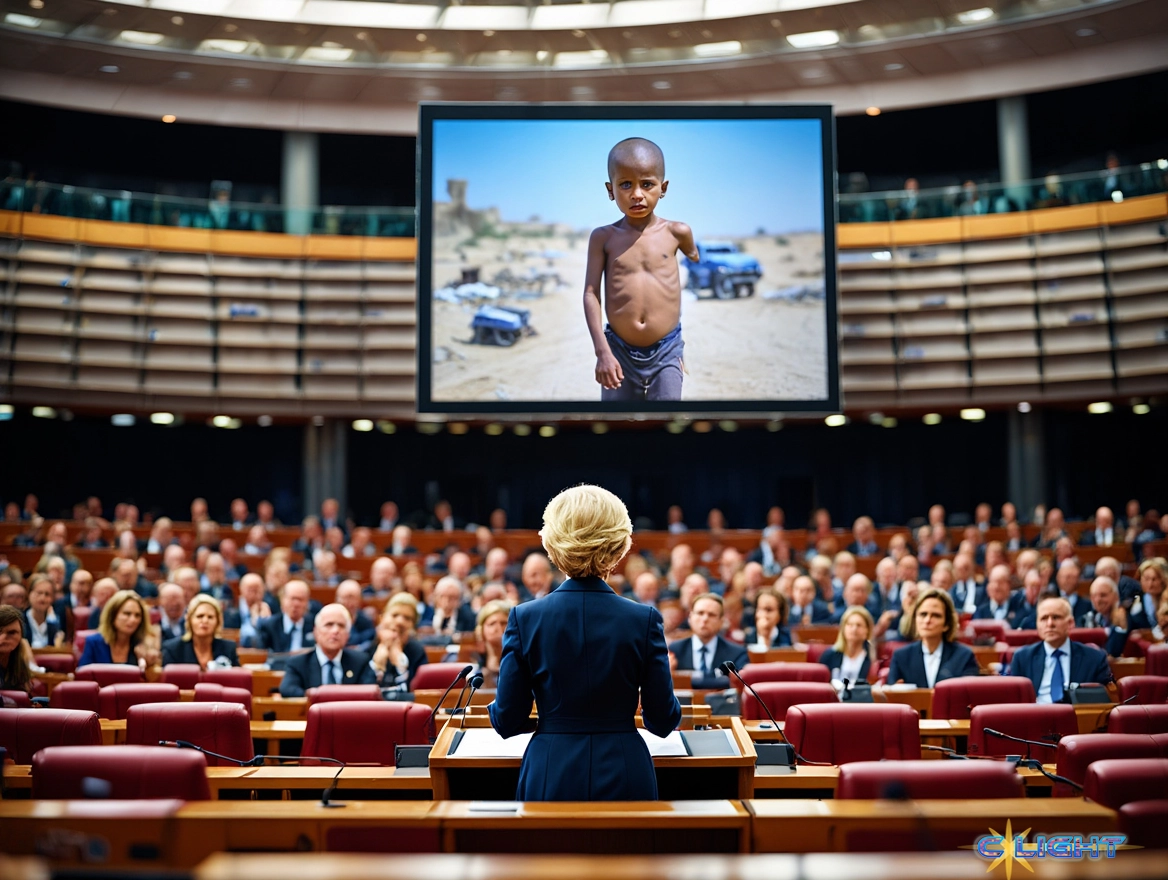4 minutes read time.
In a dramatic and sharp reversal, European Commission President Ursula von der Leyen, long considered a steadfast supporter of the Israeli government, stood before the European Parliament on Wednesday and issued a stunning rebuke. Citing a “man-made famine” that has “shaken the conscience of the world,” she announced a proposal for sanctions, a partial trade suspension, and a unilateral freeze of bilateral support for Israel. This was not a spontaneous decision, but the explosive culmination of a dual crisis: a series of audacious and brutal Israeli military escalations that shocked the globe, and a simmering political rebellion within the European Parliament that threatened the very credibility and moral foundation of the EU itself.
The breaking point was reached after 48 hours of relentless escalation by Prime Minister Benjamin Netanyahu’s government. First came the unprecedented order for a full evacuation of Gaza City, a directive humanitarian agencies immediately labeled as impossible for the one million exhausted and starving people still trapped there. This was immediately followed by the brazen Israeli strike in Doha, Qatar, an attack on a major U.S. ally that killed a Qatari citizen, violated the sovereignty of the key peace negotiator, and shattered the U.S.-backed peace process. The strike sent shockwaves through the Arab Gulf, effectively killing the Abraham Accords and prompting a unified cry of condemnation. The world was reeling, and in the halls of Strasbourg and Brussels, the pressure on the EU to act became unbearable.
For months, Members of the European Parliament (MEPs) from across the political spectrum had been growing increasingly incensed by what they saw as the Commission’s paralysis and complicity. They watched as the EU found Israel in breach of its human rights obligations and drew up lists of potential sanctions, only to be stymied by deep divisions among the 27 member states, with powerful nations like Germany and Italy blocking action. “We are going to demand that von der Leyen stop her silence, because we cannot be complicit when we have an Israeli government assassinating so many tens of thousands of people,” declared Iratxe García Pérez, the Spanish leader of the Socialists in the parliament.
The most devastating critique was the charge of hypocrisy. MEPs repeatedly contrasted von der Leyen’s bold, decisive leadership in pushing for Ukraine’s EU candidacy with her perceived timidity on Gaza. “If we had been waiting until 27 member states were ready to accept the candidacy membership of Ukraine, we would probably still be talking now,” argued Bas Eickhout, a leader of the Green MEPs. “Sometimes, you need to propose it to get things moving… That is what we expect from this commission also on Gaza.” The pressure was framed as a moral imperative. “This famine is not a natural disaster; it is a political act, and Europe must respond with political courage,” said Belgian liberal MEP Hilde Vautmans, warning that a failure to act would mean betraying Europe’s “founding promise: never again.”
Faced with this internal rebellion and the external shock of the Qatar strike, von der Leyen was forced to act. She unveiled a two-pronged strategy of punitive measures. The first, and more difficult, path involves seeking a consensus among the 27 member states for broad sanctions and a partial suspension of the EU-Israel trade agreement. Given the known divisions, this will be a significant challenge. But the second threat was more immediate and unilateral: von der Leyen announced her intention to use the power of the European Commission to “put our bilateral support to Israel on hold,” a freeze on payments that would not require the unanimous consent of the member states.

The reaction from Israel was one of fury. Foreign Minister Gideon Saar accused von der Leyen of succumbing to pressure and sending a “misguided message” that would embolden Hamas, calling her proposal “not an acceptable” way to treat a partner. But his protestations rang hollow in a Europe that was finally reaching its breaking point. After months of internal strife and cautious diplomacy, the EU, pushed by its own parliament and shocked by Israel’s escalating belligerence, is beginning to assert that it is, in fact, a partner with its own values and interests, not a silent backer of any and all Israeli actions. The question now is whether this is the moment the EU finally decides to use its immense economic and diplomatic leverage to force a change in course, or if internal divisions will once again lead to paralysis. For the first time in this long and brutal conflict, real, tangible consequences from the West seem possible.
Discover more from Clight Morning Analysis
Subscribe to get the latest posts sent to your email.










